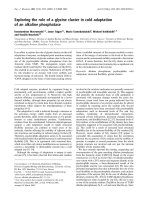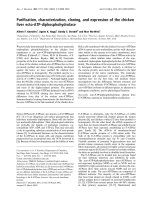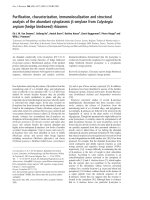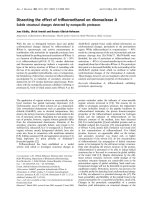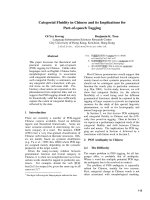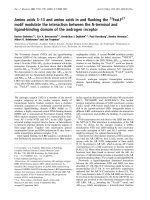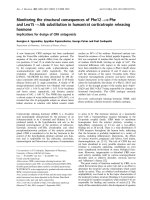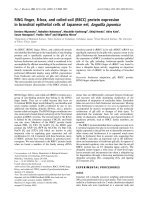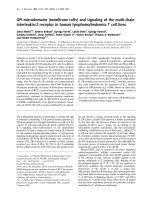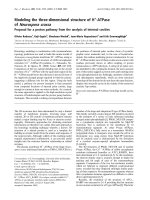Báo cáo y học: "orrection: The EVIDEM framework and its usefulness for priority setting across a broad range of health intervention" pdf
Bạn đang xem bản rút gọn của tài liệu. Xem và tải ngay bản đầy đủ của tài liệu tại đây (106.51 KB, 3 trang )
This Provisional PDF corresponds to the article as it appeared upon acceptance. Fully formatted
PDF and full text (HTML) versions will be made available soon.
Correction: The EVIDEM framework and its usefulness for priority setting across
a broad range of health interventions.
Cost Effectiveness and Resource Allocation 2011, 9:16 doi:10.1186/1478-7547-9-16
Sitaporn Youngkong ()
Noor Tromp ()
Dereck Chitama ()
ISSN 1478-7547
Article type Correction
Submission date 17 October 2011
Acceptance date 26 October 2011
Publication date 26 October 2011
Article URL />This peer-reviewed article was published immediately upon acceptance. It can be downloaded,
printed and distributed freely for any purposes (see copyright notice below).
Articles in CERA are listed in PubMed and archived at PubMed Central.
For information about publishing your research in CERA or any BioMed Central journal, go to
/>For information about other BioMed Central publications go to
/>Cost Effectiveness and
Resource Allocation
© 2011 Youngkong et al. ; licensee BioMed Central Ltd.
This is an open access article distributed under the terms of the Creative Commons Attribution License ( />which permits unrestricted use, distribution, and reproduction in any medium, provided the original work is properly cited.
Correction: The EVIDEM framework and its usefulness for priority setting across a broad
range of health interventions
Sitaporn Youngkong
1,2,*
, Noor Tromp
1
, and Dereck Chitama
1,3
1
Nijmegen International Center for Health Systems Research and Education (NICHE), Department of Primary
and Community Care, Radboud University Nijmegen Medical Centre, Nijmegen, The Netherlands
2
Health Intervention and Technology Assessment Program (HITAP), Ministry of Public Health, Nonthaburi,
Thailand
3
School of Public Health and Social Sciences-Muhimbili, University of Health and Social Sciences, Tanzania
*Corresponding author
SY: ,
NT:
DC :
Correction
After the publication of this article [1], we became aware that two last sentences in the
paragraph relied on original ideas following personal communication with a researcher, and
should not have been presented here. Consequently, the reference number 9 which was cited
for the removed issue should be taken from the article. The correct paragraph is provided
below:
The explicit weighing of criteria analyzed from DCE may improve the consistency of priority
setting across contexts and over time, but does not solve the more fundamental problem that
views of stakeholders, and therefore their expressed weights, may diverge. This is
acknowledged by the ‘Accountability for Reasonableness’ (A4R) framework [2, 3] which is
based on the believe that any consensus on priority setting weights and subsequent results
may be difficult to achieve because of these distinct perspectives of stakeholders. Instead of
attempting to resolve the problem of diverse stakeholders’ views, the A4R framework
proposes to concentrate on a fair priority setting process. On this basis, when conditions of
reasonableness, publicity, appeal and enforcement are satisfied, it would lead to decisions
that are considered fair and acceptable to stakeholders. In our view, exploring how
stakeholders' divergent perspectives on the weighting of criteria can be met fairly, is an object
for further research.
We regret any inconvenience that these corrections might have caused.
References
1. Youngkong, S., N. Tromp, and D. Chitama, The EVIDEM framework and its
usefulness for priority setting across a broad range of health interventions. Cost
Effectiveness and Resource Allocation, 2011. 9: p. 8.
2. Daniels, N., Accountability for reasonableness: Establishing a fair process for
priority setting is easier than agreeing on principles. BMJ, 2000. 321: p. 1300-1301.
3. Daniels, N., Just health: Meeting health needs fairly. 2008, New York: Cambridge
University Press.
